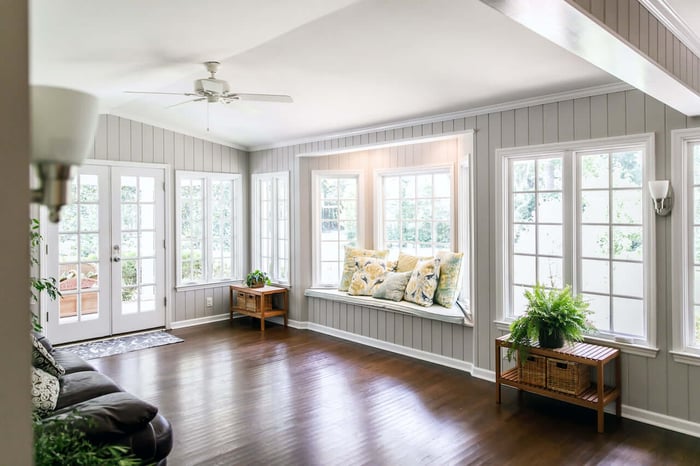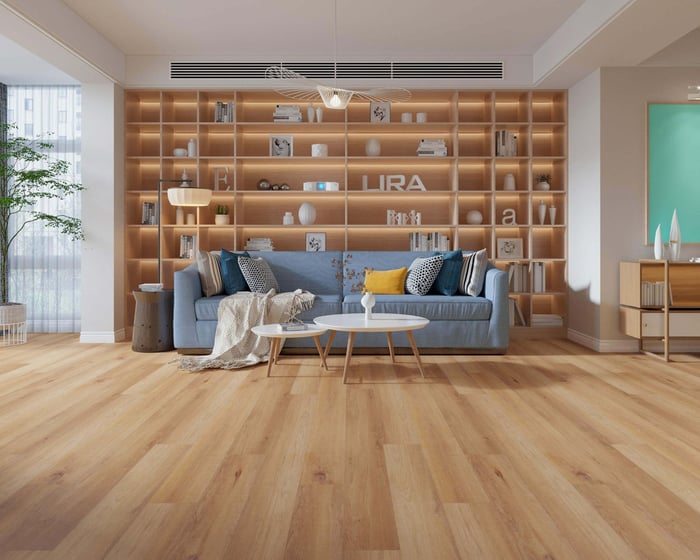When updating or installing new flooring, material choices matter. Choosing the right material based on budget, intended use, and visual appeal can go a long way toward creating the space a property owner dreams of.
Property owners seeking to outfit their new or existing property with superior flooring don’t just have one or two options to choose from, either. From hardwood flooring to real, high-quality stone, property owners can choose from resin, tile, mosaic floors, and more. However, many high-end floors require equally high-end upkeep. Choose a flooring that not only suits your current budget, but meets future care and budget needs as well.
As a property owner seeking new or updated floors, you may consider a vinyl flooring option. While opting for vinyl narrows down your choices, you still have decisions to make. Let’s dive into some of the terminology around vinyl floors and how to differentiate vinyl flooring types. At Harper Floors, we help our customers find luxury vinyl plank floors that have the ability to fully transform their interiors.
In this blog, we compare SPC vs. WPC vinyl plank floors, breaking down the pros and cons of each.
SPC and WPC flooring make excellent, affordable flooring choices for private and commercial interior spaces, including kitchens, bathrooms, office spaces, and more. However, the longevity and durability of each depends on environmental factors like foot traffic, humidity, and upkeep capabilities. Using this guide, you’ll be able to determine whether WPC or SPC vinyl flooring suits your needs best.
To shop Harper Floors' SPC vinyl flooring and more, browse our online catalog or reach out to us at info@harperfloors.com or (888) 807-2704 today.
Benefits of Vinyl Flooring
Before we compare SPC vs. WPC flooring, let's discuss why choosing vinyl flooring options benefits property owners. While many covet traditional hardwood floors for their natural appeal, solid and engineered hardwood may exceed budget limits or require too much upkeep for some. The considerable price tag results from the regional availability, labor costs, and surface finish treatments of natural hardwood floors. In addition to higher installation costs, hardwood floors require special upkeep to prevent mold, mildew, and other types of damage from taking hold. Finally, if there are ever any damages, authentic hardwood flooring planks are either cut out and replaced, or re-sanded down and re-finished.

Vinyl flooring, in contrast, is a budget-friendly, relatively low-maintenance option for both full or partial remodels. Benefits of vinyl flooring include:
- Reduced maintenance and upkeep compared to traditional hardwood
- Easy to replace in the event of damages
- Lower cost per square foot
- Expansive variety of unique patterns and colors that mimic real hardwood
What Is Vinyl Flooring?
Vinyl flooring, also known as Luxury Vinyl Plank or LVP flooring, is a synthetic flooring type that provides property owners with an affordable, customizable solution for new and renewed interiors. The two vinyl construction types we’ll be discussing today are WPC, wood plastic composite, and SPC, stone plastic composite.
WPC and SPC vinyl flooring both utilize five separate layers to create a durable final product. With each, you'll find:
- An outer UV protective layer
- A wear layer to prevent scratches and scuffs
- A custom designed, printed vinyl layer
- A PVC core
- A pre-attached IXPE underlayment
What Is SPC Flooring?

Depending on the manufacturer, the acronym SPC can represent stone polymer composite or stone-plastic composite, interchangeably. This name refers to the material used in the flooring's synthetic core. While the proportion of components used in SPC flooring varies between manufacturers, the core materials include plasticizers and polyvinyl chloride.
What Is WPC Flooring?
Like SPC, WPC flooring boasts the same 5-layer build. At its core, however, WPC flooring uses wood and recycled wood material, in addition to PVC and foaming components instead of stone-polymer or stone-plastic composites.

The recycled wood material at the heart of WPC makes this flooring type lightweight, durable, and eco-friendly. PVC and foaming components allow for added durability and moisture resistance without impacting the visual aesthetic of the outer decorative layers. WPC flooring, like SPC, can take on a variety of shades, colors, and even textures as desired by a manufacturer or property owner.
Each type of flooring has benefits and drawbacks that suit each property owner differently. Keep reading below to learn more about SPC vs. WPC flooring to help you decide which will be best for your property.
How SPC and WPC Flooring Compare

Look and Feel
Both SPC and WPC flooring offer wood-like, textured finishes, each in a wide variety of patterns and colors. However, wood-based WPC vinyl flooring boasts a more extended history than SPC vinyl and may provide a wider selection of wood looks.
Comfort
With its wood-based core, WPC vinyl flooring offers increased natural springiness relative to SPC. This added bounce increases underfoot comfort by reducing the impact your floors have on your feet and joints.
Durability
The SPC core provides advanced durability and strength when it comes to vinyl flooring. This material stands up to moisture and heavy traffic in a way that is unmatched by its vinyl predecessors. SPC vinyl flooring is highly recommended for properties in humid or high-activity areas.
SPC vinyl also absorbs less moisture if any at all, resulting in less warping or bending of prefabricated planks. Often, this decreased sensitivity to humidity and water results in fewer repairs and replacements of more limited scope.
Pets and Active Households
Most homeowners with active families and pets are concerned with the durability of their potential new flooring when designing their interior spaces. Fortunately, both SPC and WPC flooring offer built-in protection against scratches, marks, stains, and scuffs.
Factors to Consider When Buying
Feeling nervous about choosing flooring for your home or business? You're not alone. New floors can become a significant expense for many property owners, and the financial and time requirements can cause hesitation.
With proper planning and preparation, replacing or installing new floors can be efficient and timely.
Before you start tearing up your old flooring, consider these factors:
- The measurements of all rooms you plan to install flooring in
- Your interior design aesthetic
- Your budget
- Durability and comfort needs
- Timeline and availability of material
- Preferred manufacturers
- Installation and labor costs
Once you have a game plan, it's time to get started. Your first step should be contacting trusted flooring professionals in your area to schedule consultations, request pricing information, and solidify other details. You’ll want to receive quotes from more than one contractor, compare rates, and even shop around for special deals on the material you want to install. During this phase, your goals for your home or business floors may change, and having professionals already in on the plan helps you make the right changes fast.
Reach out to trusted flooring experts for answers to your questions, product information, and other guidance today.
Get High-Quality Vinyl Floors for Your Home or Business
Now that you've compared SPC vs. WPC flooring, learn the differences between vinyl plank vs. laminate on our blog.
Ready to get started? Shop online or call Harper Floors at 1-888-807-2704 for nationwide service today.









